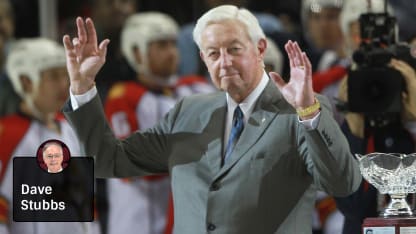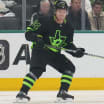MONTREAL -- They are bookends, in a way, an inspirational beginning to the most important part of his hockey career and the heartbreaking end to his life.
On Dec. 7, 1961, the legendary Jean Beliveau played his first game as captain of the Montreal Canadiens, a 4-1 victory against the Toronto Maple Leafs. Fifty-three years later, to the day, the Hockey Hall of Fame center lay in state in a closed casket on the floor of the Canadiens' breathtakingly quiet arena, the first of two days of public visitation after his death at age 83 following a lengthy illness.
In life, and in death, this gentle giant transcended the game he loved and dominated. This was never more apparent than on Dec. 7 of different years more than a half-century apart.
Dec. 7 momentous, sad day in Jean Beliveau lore
Made debut as Canadiens captain exactly 53 years before being honored at Bell Centre after death

By
Dave Stubbs @davestubbs.bsky.social
NHL.com Columnist
Beliveau arrived to the Canadiens for good from the Quebec Senior Hockey League's Quebec Aces for the 1953-54 season, having signed a five-year contract after a long courtship. He had six goals and an assist in five games for Montreal over the 1950-51 and 1952-53 seasons.
By the start of the 1961-62 season, he had played 506 of the 1,125 games in his 18-season NHL career, all for Montreal. He also had won five of his 10 career Stanley Cup championships.
Canadiens general manager Frank Selke stunned the hockey world on June 13, 1961, by trading cornerstone defenseman Doug Harvey to the New York Rangers, thus vacating the Montreal captaincy that Harvey held in 1960-61 following the 1960 retirement of Maurice "Rocket" Richard.
Beliveau didn't think much of his odds in a vote among players a few days before the start of the 1961-62 season to choose Harvey's successor.
For one, he didn't have the tenure of three men he considered prime candidates for the captaincy: highly regarded veterans Tom Johnson and Bernie "Boom Boom" Geoffrion, who had joined the Canadiens full-time in 1950-51, and Dickie Moore, who had signed a year later.
For another, Beliveau was wearing a full-length leg cast, having torn knee ligaments in Victoria, British Columbia, during a preseason game against the Western International Hockey League's Trail Smoke Eaters, the first stop on the Canadiens' cross-Canada barnstorming tour.
Beliveau was driven to the Montreal Forum on Oct. 11 by his wife, Elise, sitting in the back seat of a loaned car so he could stretch out his immobilized leg. Coach Toe Blake had summoned his players to vote for their new captain, and Beliveau cast his ballot for Moore, a ferocious competitor and a man who would become probably his best friend in life.
But it was Beliveau who was voted captain by the Canadiens, a result that shocked the winner and didn't sit well with the flamboyant Geoffrion.
"I was stunned by the result," Beliveau wrote in "My Life In Hockey," his 1994 autobiography. "Unfortunately, so was Boom, who took it badly. He never said anything to me directly, but it was no secret that he was deeply disappointed."
Beliveau missed the first 25 games of the season rehabilitating his knee. But aware of Geoffrion's unhappiness, he said he would happily give his teammate the captaincy if it would help unite the dressing room.
Blake took Beliveau up to see Selke, who sharply told them, "There's no question of doing that. The players voted for Jean, and to name Geoffrion, I would have to throw out their vote. I'll never do that."
In his 1997 autobiography, "Boom Boom," Geoffrion wrote "… for a moment I was crushed" about not winning the captaincy, adding that "a large misunderstanding developed. The rumor mill suggested that I was jealous of Jean but that wasn't it at all. … For a day or two, my feelings were hurt because I finally had to face the fact that I wasn't the most loved guy on the team. I congratulated (Beliveau) on winning the C although I obviously didn't really hide my disappointment, either."
Already the winner of six Stanley Cup titles with the Canadiens and a 50-goal scorer in 1960-61, when he won the Art Ross Trophy as NHL scoring leader, Geoffrion would play five more seasons, three in Montreal and two with the New York Rangers, before being inducted into the Hockey Hall of Fame in 1972.
Beliveau scored 18 goals with 23 assists in 43 games in his injury-abbreviated first season as captain.
From there, he helped the Canadiens to five more championships while cementing his reputation as one of the greatest players of all time. "Le Gros Bill," as he was nicknamed, was Montreal captain for 619 regular-season games and 93 in the Stanley Cup Playoffs until his retirement and immediate Hall of Fame induction at the end of the 1970-71 season.
Beliveau won seven League titles as a Canadiens vice-president, fans forever flocking to his arena seat in the Forum and, after his front office retirement, at Bell Centre.
And they would come to Beliveau 53 years to the day of his maiden game as captain, in a much more solemn fashion.
Beliveau's casket was placed on the Bell Centre floor on Dec. 7, 2014, five days after he died. He lay at the south end of the building, between the blue line and the net the Canadiens defend for two periods.
As they had for the legendary Richard in 2000, tens of thousands of fans filed in to extend their condolences to Elise, the couple's daughter, Helene, and her two adult daughters, Mylene and Magalie.
On Dec. 7 and Dec. 8, for nearly 16 hours, the fans came to pay their respects. The Beliveau women shook the hand of every single one, often consoling mourners who were shattered when they finally arrived at the end of a rink-length red carpet to this icon's coffin.
"I hope Jean would be proud," Elise said later.
When the strength of this family was mentioned to Mylene after the first day of visitation, she shrugged her shoulders gently and replied, "I'm meeting these people for two days. My grandfather did this for 60 years."
The polished casket was covered in flowers, beneath two huge photo banners, surrounded by the Stanley Cup and three individual trophies Beliveau had won: the Hart, twice, as NHL most valuable player; the Art Ross; and the Conn Smythe, as postseason MVP. At one side was the massive Beliveau statue that previously was and now is displayed in a Bell Centre courtyard, framed by two Canadiens logo floral tributes.
On Dec. 10, Beliveau's funeral at nearby Mary Queen of the World Basilica Cathedral, was broadcast live on national television in English and French. His coffin arrived and departed the church in a blinding winter storm, the snow stinging the skin as it came down almost horizontally.
"It was a hockey day. A hockey player needs snow and we had a lot of it, a nice little storm," Elise would say, smiling. "It was OK. It was fine. But that was a nice ceremony, my God almighty."
It was mentioned to her that it had been 53 years to the day between her late husband of 61 years having played his first game as Canadiens captain and then being emotionally remembered by many thousands on the floor of their arena.
"John was forever proud of his team and his teammates and everyone in the Canadiens family," she said, using the English version of his name as she often does. "He was such a good man. He was a wonderful person. He was always ready for old people, young people, kids. He had them all around him. How special that they came to him one last time."
















